#hierarchy cast
Explore tagged Tumblr posts
Text


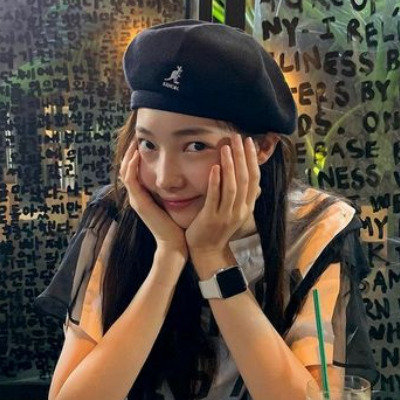
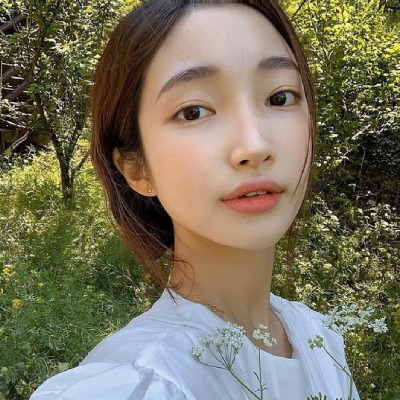


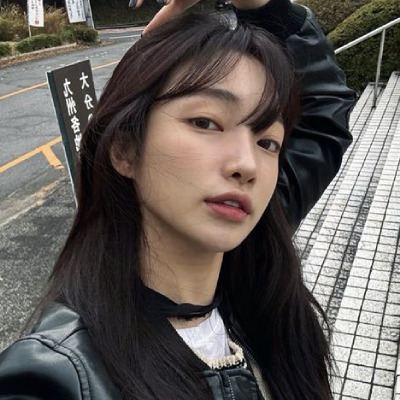
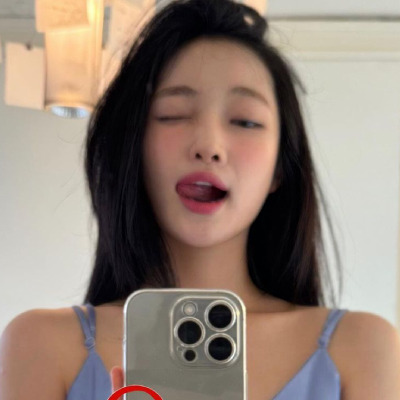

#girls icons#icons#twitter icons#female icons#ji hyewon#ji hye won#icons ji hyewon#ji hyewon icons#ji hye won icons#chi haewon icons#icons chi haewon#chi haewon#chi hae won#haezy___#hierarchy cast#hierarchy kdrama#kdrama icons#doramas icons#korean actresses icons#actresses icons#actress icons#icons actress#icons actresses#dorama moodboard#dorama layouts#kdrama moodboard#kdrama layouts#korean drama icons#asian actresses icons#site model icons
58 notes
·
View notes
Text
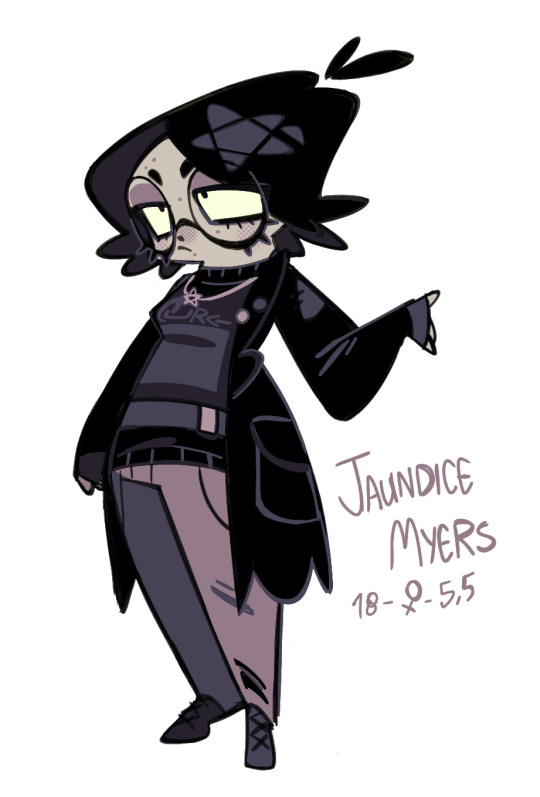
"it's *not* some fake fairy dust bullshit, onion. it's witchcraft, and it's real."
jaundice myers, a companion to onion, punching bag to the big fish of postmortem high, and one of the supporting characters of reassassination. a self proclaimed witch, she spends her days listening to goth music and practicing curses to finally thwart her enemies.
+ inspo sheets for her and onion!
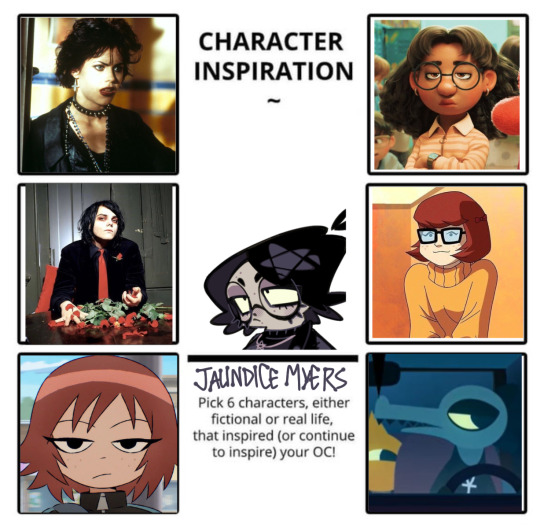
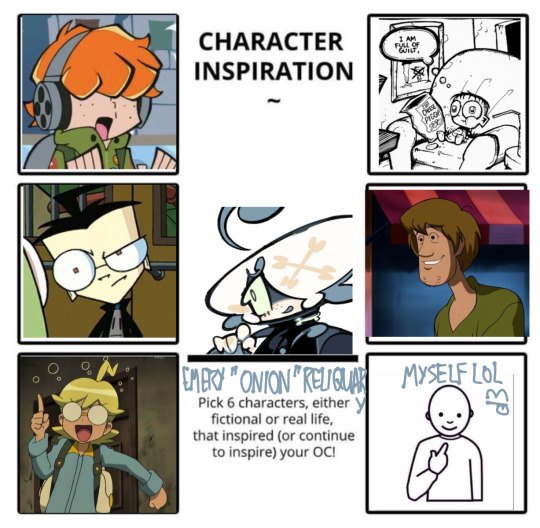
#zeno's art#ocs#reassassination#jaundice myers#emery onion reliquary#NEW CHARACTER ALERT!!!!#(well shes not new im just finally drawing her on here)#shes one of the supporting cast and isnt too important but does show up thruout the comic#shes very bitter and kind of mean#like she acts like shes not friends with onion cuz she believes they're below her in the social hierarchy#tho they are friends#she acts like she doesnt care abt the social hierarchy but she REALLY does#she has beef with octavia for virtually no reason#theres more to her but you find that out laterr :)))))))))))
221 notes
·
View notes
Text
unordinary 340 spoilers
so i’ve been thinking about it and on one hand, isen suggesting they leave john and run is a pretty sobering moment because he really is just clinging to the first real opportunity he has to protect his best friends who won’t stop getting into situations where he quite literally can’t but on the other hand it is also kinda like. (gently grabs isen by the shoulders) hey man. we saw valerie’s level. i think you’re gonna need that guy later
#unordinary#unordinary webtoon#we as in readers btw.#i goof on him a LOT but i do actually really like isen#and regardless of the fact that i would say he’s in the wrong here it was a really good character moment#also. i 100% do not expect him to be thinking about this considering the circumstances and i’m willing to be challenged on this#but i feel like the rest of the main cast tends to kind of forget that john and sera are like. they are best friends as well.#and part of this initially was because of the hierarchy (cross-rank friendships being suspect)#followed by them (john and sera) being in conflict for a good amount of time of them. actually witnessing that relationship.#if that makes sense. and i bring that up because (and again i don’t blame isen! the Circumstances)#isen is (unknowingly) suggesting leaving someone else’s best friend to die in order to save his own.#which. ough.#even on my silly posts you gotta watch out. you never know what i’ll put in the tags
80 notes
·
View notes
Note
That made me think, like, what if Fem!Yuu was crossdressing as a boy because she thinks in an all-boys school she would get bullied or even made fun of for just being a girl (internalized misogyny because of a bad upbringing), but surprisingly the ones who find out treat her well, and that gets her emotional.
Yeah now she doesn't want to return to her world because at least she get treated as decent human here.
NO I GET THIS. you may get treated like shit in this world but at least you're equal shit!!! if I had the choice between that and living in this hellscape...
I also think crossdressing fem!yuu is a fairly popular headcanon. I think a lot of girls would prefer to hide their identities for safety/security/confidence etc
#*ੈ✩‧₊˚asks!#especially if they're the same age/younger than the main cast yk#I think older yuus would have some advantage because they'd be less likely to be approached#nrc students seem to have a thing about age hierarchy
17 notes
·
View notes
Text


Class is an outdated attempt at socio-economically categorizing humans within the industrial society.
Marxists, especially the former Marxists, as well as all the Left tendencies inspired by Marxism, have relied on the same-old tripartite categorization of society dating back to Aristotle, now divided into three big classes. Contemporary sociologists of the Marxist schools of sociology will be using the stats of median income to show how they’re right about it; where indeed the «middle-class» exists and it’s been going down toward poverty levels in the last few decades, where the upper group of ultra-rich just kept getting wealthier and more powerful. All of it is true, yet only within a tiny, limited aspect of the mastodon. It shows us where most people are situated in terms of income, yet not saying much about all these people located elsewhere up or down the curve. That these people aren’t actually part of any unified class, within the tripartite model of “middle/proletarian”, “poor/lumpen”, or “rich”. In reality — or I mean closer to what could be the social reality — a median in statistics only best represents where a bell curve is located within a spectrum of linear-organized data.
Having lived through years of being on the workplace, in the streets, outside of academia, will reveal that the “world” is a much more complex and especially fluid, dynamic place; not made of categories and classes, but people. Especially groupings of people, constantly organizing and plotting for power. Either to gain more or maintain their “acquired rights”.
This narrow marxist interpretation also serves another purpose than showing the social inequalities capitalism creates. It is useful for hiding or overlooking the privilege-building or consolidation of these same groups of Left-oriented middle-class intelligentsia, or petty bourgeoisie commonly found backing Center-Left parties, NGOs, trade unions or more pervasively running a vast portion of the nonprofit sector, especially the sector more politically vocal about issues of social justice. They are struggling for their own elevation through the social ladder, in conflict with who they perceive – with a level of accuracy – as those limiting their access to higher positions of power.
Same goes for the «rich». As if you’d ask me, for instance, who is the richest person/family on the planet, that’s a question no one can definitely answer. Also an equally complex question : who are the « rich »? Not only wealth is a more complex notion than just net worth, but the super-wealthy do not only deal in monetary values... they’re also using other kinds of more «hard» assets and currencies like resources, precious metals, and now big data. The super-wealthy also tend to be super-connected people. Their wealth would not be very meaningful if this wasn’t a factor of power within social networks.
The question of their might makes it even more complicated when you look at their political schemes and networks. And even among this super-rich crowd, there are factions, milieus, gangs playing Monopoly with the world’s con-o-mies. Ever since Trump went into politics, for instance, this became clear there wasn’t only one power gang in the US, that the most repulsive of these, the White supremacist Christian ultra-conservatives, was engaged in an unprecedented battle against the neoliberal establishment, the dominant gang of the last few decades. This is even true in a totalitarian rule like China, who has different factions fighting within the Party, down to occasional vendettas, in order to consolidate power. Everywhere across capitalist societies there are smaller rich of the upper middle-class, all the way up to the mega-billionaires, with differing stakes in the industry, or gradients of political entry – and positions, from the progressive Left the Rothschild family and Soros to the ultra-conservative Far Right like Murdoch and the Koch.
Hence categorizing the “rich” is always more complicated than it seems. But to me, the ultra-rich aren’t as important as they used to be as social antagonists. I know they are doing terrible things, engaged in running awful schemes that keep billions of people into misery. And they are, in all appearance, holding the reins over governments, the media, NGOs you may work for, and most businesses you might work for.
However you might notice that your local progressive resources center for the homeless is managed by rather middle-class people. This is adequate, as here we are dealing with a charity service, notoriously structured by this same-old Christian binary relationship between haves mores and lesses, or between the higher-educated and the low-educated. The moment you’ll see a homeless resource center run by the homeless, well, that’ll no longer be charity, but rather autonomy. Yet social relations keep being structured into hierarchies between castes of different levels of privilege.
Society, being itself a wide-open pyramid scheme, is thus filled with a myriad of people involved in more or less filthy games that deprive others from having the same quality of life they enjoy. When it’s not about White nuclear families raveling in their comfy private bubbles on the countryside it’ll be urban hipsters keeping nice apartments for their artsy gangs of friends. You might even notice a level of disparities — and consolidation of privilege — within the milieus of the homeless, and the prisoners. But as usual, there’s a share of good economic motives behind all this privilege-building. In big cities targeted by intense gentrification, renters are better be organizing with friends, or building networks of friends, in order to share the rents between people they know so the rents remain as low as possible. That also gives the more radical-minded the possibility for conducting rent strikes on more large scales or do other kinds of anti-eviction or anti-hike campaigns that got more effects than just isolated renters filing formal complaints. Worker coops are a way for them to avoid « falling » in the streets by having decent self-managed jobs that may also contributed to accumulating social capital. As usual, collective organizing is a powerful flagship for gaining more power.
But then again, when more power is gained, what is done with it? When peer groups create their housing and workers’ coops, or even collectively-run squats wherever they still exist, what is the place left in their world, at the end of the day, to all the lesser-empowered outsiders? To those often ending up being — yet again — at the receiving ends of privilege-building social machinations. Being “socially-awkward”, being misfits or too “triggering” makes these seemingly more horizontal, democratic, collectivist schemes as yet again exclusive to those disabled, handicapped, aged, gendered, or just not enough socially-skilled for inclusion. Because, like in the rest of society, these projects are produced through in/out-crowd dynamics, generating social exclusion as byproduct. One way or another, it goes down to be facing locked doors, walls, fences, more sleeping on the sidewalks or at best navigating through precarious rents with deranged roommates… so therefore the social hierarchy of prisons is being maintained. Of course this has to do with landlords and « bosses » owning your life by the balls (e.g. a class relationship), but how do people also not reinforce this through caste dynamics? So even when these schemes are considered to be helpful or charitable, the separation they induce — here’s a place where these late Marxists known as the Situationists got it right) is still by essence, and functionally, alienating. However there is little doubt of the good that some of these people do, despite the alienating structures they’re working in.
How does a caste system works?
Essentially, with the reproduction of identitarian cults, clans or families, and more importantly their related cultures, that allows them to relate to each other. Culture — including cultural representations — is the tie that binds them; as cultures are being used as a means to reinforce the caste’s status quo, redefine its morals, and set the boundaries for inclusion/exclusion as well as serving other control imperatives. These aren’t patterns we observe through big social categories such as classes, that only defined by their mutual economic productive activity. The caste reproduces its own systems of representations and relations, beyond its mere socio-economic activity. The former actuates the other, and provides a kind of appeal, by hype, notoriety, prestige, edge, luxury or any other sort of added social value to it. A sense of privilege, without really providing with meaning.
I’ll be elaborating more on this in an upcoming text on countercultures and normalization, but in the Western rich urban hellholes we could have witnessed over the past years a movement from parts of the punk subcultures toward hipster, more streamlined upper castes of artsy citizenry. Mainstream fashion of the trendy urban lifestyles was reinvigorated by what used to be signifiers of marginal milieus... tattoos, piercings, punky black clothing and asymetric hairstyles, even dog-herding (that for some has been replaced with having children), are all now predictable, unsurprising elements of the urban environment, found in just about any of the world’s metropolis, even outside the Western world.
This has been a way to be part of the “in crowd”, to be accepted not not only into squats, but private rented spaces, get decent jobs at trendy hot spots, and more importantly, get relationships aplenty. That’ll be controversial to say about the same of the normalization of the “LGBTQ+” as social identities, that have played the same socio-economic roles and with the same ends, even tho by themselves they represent a fourre-tout of different minority gender identities and sexual preferences rallied together as one big category, for everyone under its banner to relate to regardless of its meaning for every one’s sensibility.
The idea is not to be criticizing any of these subcultures or their values, or even to be blaming urban trends for normalizing them, but to look into how caste dynamics are functioning, thanks in great parts to the use of cultural signifiers and their related politics. Also to realize how the individual, or the person as themself, is being kept silent and invisible by these caste politics, despite all the social media celebs, who’re really not standing for — and by — themselves but literally posing on a stage through a set of prefab representations. How if you aren’t identifying as one of the recognized identities, just choosing to identify as a “yourself”, or a “person”; this becomes a void for the social management of privilege and oppression. There are no non-gender pronouns for persons, only for lifeless objects, or groups to some extent.
This is — in my view — the deepest cause behind the epidemic of mass-killings we especially got in the US. While some of these are mostly based on demented ideologies of hate against more or less specific minority groups, many of the mass-killings are often committed by disenfranchised, misfit, socially-isolated males who for a reason or another, lacking a better analysis of what’s happening to them in this world, decide to stick it up to those they see as their most direct oppressors. Namely, the social castes in their environments. And in a way, it is true that crowd/mob dynamics tend to make human groupings in general to become more oppressive while losing self-awareness as their numbers increase in a given context.
If the Left would be truly understanding the dynamics of social exclusion, oppression and privilege, how do they work, perhaps they could be helping to some level against such sprees of murderous violence that only now benefits more despotic police controls of the public place. But the Left has remained stucked, as some anarchist critiques know, in this endless spiral of outdated analysis of social and political dynamics, centered on our well-known cartoonish representations produced by Marxists. Castes are defined by a lot more than just the productive activity of their members, and equally the socio-cultural reproduction that defines them goes beyond their mere socio-economic productive roles, when they got one in common, even if we consider society as meta-factory.
The issue of how Leftists could make it better, with a better analysis is beyond me. More so, it ain’t really my own interest. Still, I find it harder to not be caring about the mass-shootings, and in fact the « not in my lawn » approach to social problems might not so easily apply here, as anyone could potentially be affected by these sudden bursts of extreme interpersonal violence.
The purpose of such a perspective on social relations around us is to not be fooled by deluded beliefs in the radicality of our « projects » or initiatives, and to look at those with a more critically realistic lens that shows their shortcomings and weaknesses, standing in the way of the total anarchy or the social revolution you might be after. As to be reproducing caste relations can intrinsically undermine any initiative aimed at equity, autonomy or free association.
As I said too often, anarchists and nihilists have a specific opportunity — often wasted — of creating a social tabula rasa, that negates both the dynamics of privilege-building by putting the deeper issues of property and capital-building into question, while also, through patterns of free-based relations, to be making the issue of «social progress», pushed for decades by the Left, to become irrelevant.
Like there’s no need for work within the industry if we choose to liberate goods instead and creating a commons around everything, where everyone can enjoy shit without the trappings and hindrances of both bureaucracy and property, from being on welfare to «buying land», we’re still being submitted and deprived from an immediate relationship with the natural world. There’s no need for affordable housing if you find a way to occupy spaces for living, and especially shared living. There’s no need for better working conditions if you abolished the need for money — in the first place — in order to have good living conditions, as especially to be able... to just make friends, lovers, accomplices or just have a good conversation with some other human, regardless where they’re from. There’s no need for these demoralizing homeless shelters if you got organized squats where everyone has at least their shot at a living-together, and from which other occupation projects may arise.
The power of negation, is one not being asserted by the liberal agency. Neither the one of supposed « radicals ». Or this false negation will be held contained within their own communal bubbles, yet never outwardly-asserted. And in fact, the Marxists have an historical tendency at postponing negation, as revolution is an evolutionary process where, first, we must build the conditions for the proles to be able to negate the State and capital... as if they had found the secret to immortality!
Therefore, like with the rest of the liberal bourgeoisie, breaking the law, seeking pleasures against the dominant morals, will be reserved for the private space, of the caste, the communal in-crowd, or the family, or on a private island. And the more harmful immoralisms (such as rape, abuse and other violences) might also break loose due to the safety bubble promised by privatized spaces, in milieus where they hardly would be allowed to happen in broad daylight.
But are these really negation, or just reconstruction of same-old patterns of appropriation and exploitation, inherited from the dominant morals? A transgression ain’t necessarily negation of an order but rather its preset contradiction, as “rules are meant to be broken”. The “anti-” principle is not an “a-” principle, or abscence of principle; it is an against not a without. Satan exists because of God. So the bank robber or cryptominer is still after making big money, only innovating in their fulfillment of the well-known capitalist imperative (unless of course they throw the money in the streets). I ain’t saying it is wrong... only that it is not negation of an order and its values, where the person takes the liberty to make their own of the latter, asserts power over their own world, making themself emperor and god over it.
Absolute negation of all orders — the questioning of everything — is what is necessary to revert the power of the totality over ourselves. Therefore we cannot truly avoid or abolish these caste relations that separate us both from each other and from ourselves — as well as the world around us — without putting their imperatives, values under the crushing mill of the cold, concrete logic of total negation.
Property is not only theft. Fundamentally “property” is just not something that exists. Your comfort zone known as your household, or friend’s commune, or mansion on top of the hill... are only a privatized space made-up by capitalism’s territorializations and reinforced by walls, doors and locks. It is only «real» as far as it is a relational construct, enforced by the threat of judicial or interpersonal violence. You cannot pretend anarchism, even less «communism» while at the same time enjoying these levels of privilege provided to you by an invisible, unavowed caste system. Well you can... of course! But that is more of the same-old Victorian hypocrisy, reinforced by equally Victorian-era ideologies pretending to oppose the dominant system. You may choose to be a conservative so to be less an hypocrite — indeed — yet the status quo of the caste system will be maintained, only more bare. My postulate, that is not so important to consider, is that 19th century classical liberalism has kept Western civilization from being a full-fledged official caste system, or at least this was delayed by a century of class-defined struggles.
Regardless. The wild, the feral, the natural domain does not know these territorializations. Or neither cares about if they know. The wild one only cares about their own sustenance, protection, pleasure and well-being. Anything else, any attempt at accommodating with any level or sphere within the caste system, means becoming more civilized, or over-civilized, as these are the mostly-intangible yet highly-recognizable walls of civilization, defined by culture above politics and economics. A vagabond can keep freeloading luxury hotels or chic cafés, in order to partly avoid the misery related to homelessness, or even hang out at student parties or exec clubs, but what will chase him off from these spheres will not be their bank account, official status or even their political allegiances; it will be their external appearance, their tenure, their speech and etiquette.. or lack thereof. As the cultural standards are what makes these social categories to be castes. Not classes. Because, to repeat, castes are culturally-defined — more than socio-economically defined — groupings.
So I am not here posturing for an anticiv purity by rejecting caste relations; but this could be useful as an ideal for a direction. Or giving rationale and analysis to a life where the radical critical thought makes you a social misfit, anyways. It can be interesting to be social hacking across the cultural layers of this garbage every caste uses to reinforce themselves, and many of us do achieve this, to different levels of effectiveness. But then again, will be driven by a will that is your own, or only reflect the desires mass-produced for the masses to follow? As for every caste there are different means and modes to attain what everyone in this society is after.
Doesn’t the wild one only contents in seeking power over their own existence? Why, otherwise, would they be seeking any larger power, if not for chasing the aims defined by the dominant power dynamics? For having the privileges they envy so much from any of the castes above them, or for « ruling in Hell, instead of serving in Paradise »?
Perhaps because such dynamics as the terrorism of the judicial system are hindering on this self-power. That the goal would not be to become yet another layer of judicial system, like the call-out culture appears to be doing.
There lies the importance of the initial thesis of this tension. That the Marxist and Marxist-leaning tendencies of the Left have been from the start adopting the class struggle analysis in a way as to brute-force the emancipation of people only through their own hierarchical systems. This is why they’ll always be confined, mentally-restrained, to the notion that any self-empowerment, self-defense, and liberation can only be attained through mass social avenues and means; as these reflect, more deeply, the need for empowerment of a more or less specific caste of «intelligent» educated middle-class people, over what they’ll always perceive as a mass of people who are in the dark, who need saviors or organizers or hot-blooded, loud-talking revolutionary leaders to pull them out of their politically-induced trance.
Not to say this was the case of enlightened, fearless rebels like Fred Hampton, Geronimo, Novatore or Harriet Tubman. These were in my opinion more like the feral ones that undermined the consolidated powers of their times, the society subjected to a predominant caste. Needless to say… you’ll also notice they were also not our well-known arrogant, power-hungry White college kids from the suburban middle-classes.
So the Marxists need this vague, Cartesian model for a social category — the class — that is inherently defined by a position within the production chain of Industrial Society. As in their view, one cannot be else than a Worker, or a Prole (and perhaps including the lumpen prole) in order to take part in this class struggle toward the liberation of all the Workers. But are these leaders, or organizers, ever been really the Workers they claim to be leading to liberation? Aren’t they instead positing for their own empowerment over the Workers, by the use of these Workers workforce to push for a change of power dynamics, where this intelligentsia caste attain a higher privileged status within the processes of production? In the neoliberal society the best they’ll do is to have well-paid white collar positions, perhaps even an entry into state politics within a minority party. Which doesn’t discount for the sleazy corruption of the lawyers and real-estate profiteers taking higher positions of power within the dominant parties. But, restating the obvious that I said earlier, they’re all chasing the same sausage, only through slightly different means and modes. And think about... if they’d, once again, come to terms with the whole capitalist state like the Soviets did, they’d have the highest positions in society!
So you are anticapitalist? Great. But “anticapitalist”, just like “antifa”, is a negative position, which doesn’t say much as the kind of world you want in the place of the existent order. What does it means to you in daily life, beyond a few protests and graffiti?
You are maybe communist? Super. And given it is still subversive thing in many parts of the Western world, this gives you a little of rebellious edge. But then again, whose communism? If you are only after the Commune then which commune are we talking about? The Communal form of property Marx himself told us about, that the Ancient Greeks invented, those brutally partiarchic, slave-owning landlords, who weren’t that different, actually from the Founding Fathers? The Commune of Friends, where all you need is to become a “Friend” in order to be included and treated as equal? So what is it you call a Friend, then?
My intent here is not to drag everyone in the mud of their own grandiose projects or claims (no matter how I’d love to!) but to be looking into what people are really after, and for whose specific interest. As, like a Stirner would say, as far as the Commune is not my own, or as long it is not knocking at my door for any friendly motives, it is strange to myself; it means nothing to me, as it is only to the benefit of a specific group of others.
Not only it is not so much benefiting to me, but a very vague mass of «proles», comrades or Friends that I may or may not be part of, depending on the analysis of the leading core group in charge of defining the social categories and their narratives (also known as the “ID politicians”). And only my being included as a proletarian comrade I may benefit from the leftovers of this nomenklatura. I do eat the leftovers of proles on a regular basis, as part of my means of survival and for secondary ecological aims, but it is never as retribution for serving under the wing of this social category.
The world is driven not by money, but by narratives and their representations.
There were times where men couldn’t live without God. Or without a hunt. Or without fire. Equally, a « world run by money » is a capitalist, materialist narrative of the late industrial age. Such narrative, just like any other, becomes existent due to its supportive system of power relations. Yet it won’t necessarily be meaningful… most often it won’t. If you let yourself be defined and driven by these, written and drawn by a group of others, you let yourself, again and again, be fooled and controlled by the group(s) enforcing it, then it will become an unavoidable fact of existence. Hence this group de facto becomes a caste above you... the hierarchs owning all the secrets of your forever-delayed liberation. Accepting them to define me is accepting the hinges of their control over me.
And let’s make it clear to some of my potential detractors, that the Marxist Left here was used only as example among many other iterations. The Far Right or Alt Right, as we could witness over the past few years, tends to be more successful these days at their games of gaining domination over yet another mass of (much) less educated/intelligent peoples for their own caste benefit. They are, after all, connected to specific groups — the old White supremacist aspect of the wealthy establishment — fighting to regain the power they apparently lost through the Post-War, and especially post-Civil Rights Era neoliberal order. Instead of the class, they’ll be using the more retrograde social categories of race and/or national identity. These were, after all, the first identity politics of the Modern world, in the republican, industrial, post-religious world where scientism and Nation-States purportedly replaced the old religious ideologies. The retrograde Alt Right, more classic liberal than actually conservative (and much less « libertarian »), equally got their own priests and popes of social justice, pandering on inherently shallow, brutish definitions of the «human» as if due to being older, or before, they were any more accurate or righteous than the recent «corruption» of the LGBTQ+, the Women and the non-White social identities, undermining their former, ages-old domi-nation over bodies. Are these new categories produced by the new Left and reproduced by the social media empires – led by White normative men, by the way — any more authentic or accurate? I doubt that.
The only social identity that is accurate, is yours, or mine. The question that you may represent, not the prêt-à-porter answer. That is the only one, removed from even the official citizen and corporate definition enforced by the state from shortly after your birth as physical living being- that can define you.
Who are you? Or what are you?
Am I, the author, in a position to know better than you? I only know, for sure, that you may not be what you pretend, but something more, or less, or else. You may even possibly exist!
#desi#desiblr#capitalism#castes#class struggle#hierarchies#inequality#Marxism#privilege#society#fauvenoir#human pyramids#class war#class politics#classism#anarchism#revolution#climate crisis#ecology#climate change#resistance#community building#practical anarchy#practical anarchism#anarchist society#practical#daily posts#communism#anti capitalist#anti capitalism
9 notes
·
View notes
Text
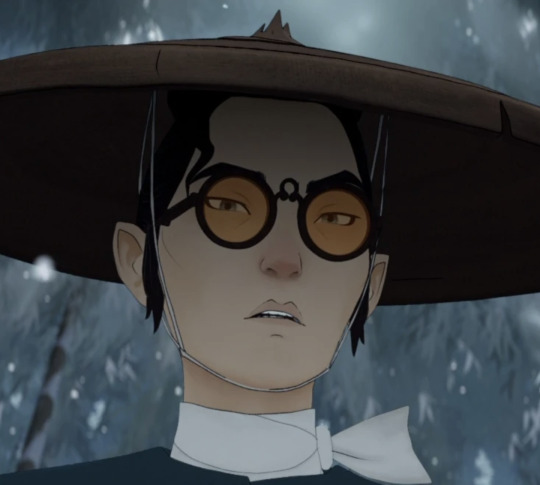
I watched all eight episodes of season 1 of Blue Eye Samurai over the weekend. I then went browsing because I wanted to read some online reviews of the show to see what people were thinking of it and also because I wanted to interact with gifs and art, as the series is visually stunning.
Yet, in my search for opinions on the show, I came across several points I'd like to address in my own words:
Mizu’s history and identity are revealed piece-by-piece and the “peaches” scene with Mizu and Ringo at the lake is intended to be a major character reveal. I think it’s weird that some viewers got angry over other viewers intentionally not gendering Mizu until that reveal, rather than immediately jumping to gender the character as the other characters in the show do. The creators intentionally left Mizu’s gender and sexuality ambiguous (and quite literally wrote in lines to lead audiences to question both) to challenge the viewer’s gut assumption that this lone wolf samurai is a man. That intentional ambiguity will lead to wide and ambiguous interpretations of where Mizu fits in, if Mizu fits in at all. But don't just take my word for this:
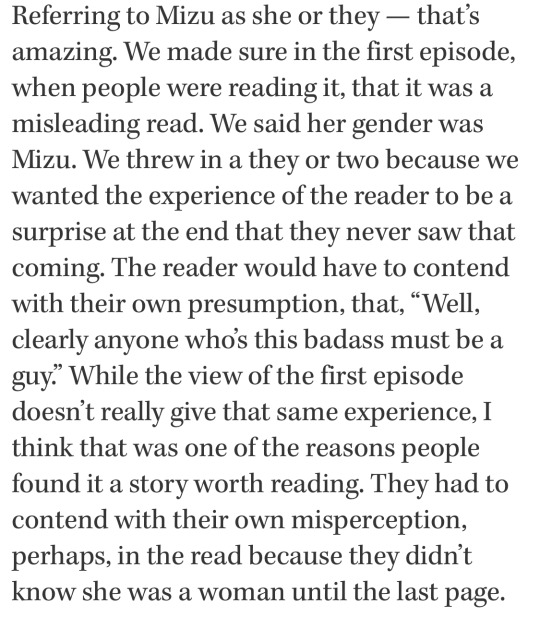
Re: above. I also think it’s weird that some viewers got upset over other viewers continuing to acknowledge that Mizu has a very complicated relationship with her gender, even after that reveal. Canonically, she has a very complicated relationship with her identity. The character is intended to represent liminality in identity, where she’s often between identities in a world of forced binaries that aren’t (widely) socially recognized as binaries. But, again, don’t just take my word for this:
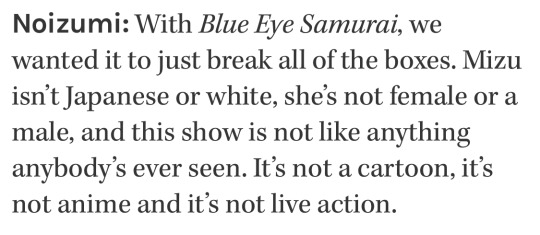
Mizu is both white and Japanese, but she is also not white and not Japanese simultaneously (too white to be Japanese and too Japanese to be white). She’s a woman and a man. She’s a man who’s a woman. She’s also a woman who’s not a woman (yet also not quite a man). But she’s also a woman; the creators said so. Mizu was raised as a boy and grew into a man, yet she was born a girl, and boyhood was imposed upon her. She’s a woman when she’s a man, a man when she’s a man, and a woman when she’s a woman.
Additionally, Mizu straddles the line between human and demon. She’s a human in the sense she’s mortal but a demon in the sense she’s not. She's human yet otherworldly. She's fallible yet greatness. She's both the ronin and the bride, the samurai and the onryō. In short, it’s complicated, and that’s the point. Ignoring that ignores a large part of her internal character struggle and development.
Mizu is intended to represent an “other,” someone who stands outside her society in every way and goes to lengths to hide this “otherness” to get by. Gender is a mask; a tool. She either hides behind a wide-brimmed hat, glasses, and laconic anger, or she hides behind makeup, her dress, and a frown. She fits in nowhere, no matter the identity she assumes. Mizu lives in a very different time period within a very different sociocultural & political system where the concept of gender and the language surrounding it is unlike what we are familiar with in our every-day lives. But, again, don’t just take my word for this:
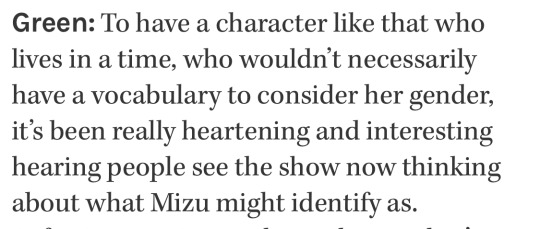
It’s also weird that some viewers have gotten upset over the fact women and queer people (and especially queer women) see themselves in Mizu. Given her complicated relationship with identity under the patriarchy and colonial violence, I think Mizu is a great character for cis-het women and queer folks alike to relate to. Her character is also great for how she breaks the mold on the role of a biracial character in narratives about identity (she’s not some great bridge who will unite everyone). It does not hurt anyone that gender-fluid and nonbinary people see themselves in Mizu's identity and struggle with identity. It does not hurt anyone that lesbians see themselves in the way Mizu expresses her gender. It does not hurt anyone that trans men see themselves in Mizu's relationship with manhood or that trans women can see themselves in Mizu when Mama forces her to be a boy. It's also really cool that cis-het women see themselves in Mizu's struggles to find herself. Those upset over these things are missing critical aspects of Mizu's character and are no different from the other characters in the story. The only time Mizu is herself is when she’s just Mizu (“…her gender was Mizu”), and many of the other characters are unwilling to accept "just Mizu." Accepting her means accepting the complicatedness of her gender.
Being a woman under the patriarchy is complicated and gives women a complicated relationship with their gender and identity. It is dangerous to be a woman. Women face violence for being women. Being someone who challenges sex-prescribed norms and roles under patriarchy also gives someone a complicated relationship with their identity. It is dangerous to usurp gender norms and roles (then combine that with being a woman...). People who challenge the strict boxes they're assigned face violence for existing, too. Being a racial or ethnic minority in a racially homogeneous political system additionally gives someone a complicated relationship with their identity. It is dangerous to be an ethnic minority when the political system is reproduced on your exclusion and otherness. They, too, face violence for the circumstances of their birth. All of these things are true. None of them take away from the other.
Mizu is young-- in her early 20s-- and she has been hurt in deeply affecting ways. She's angry because she's been hurt in so many different ways. She's been hurt by gender violence, like "mama's" misogyny and the situation of her birth (her mother's rape and her near murder as a child), not to mention the violent and dehumanizing treatment of the women around her. She's been hurt by racial violence, like the way she has been tormented and abused since childhood for the way she looks (with people twice trying to kill her for this before adulthood). She's been hurt by state-sanctioned violence as she faces off against the opium, flesh, and black market traders working with white men in contravention of the Shogun's very policies, yet with sanction from the Shogun. She's been hurt by colonial violence, like the circumstances of her birth and the flood of human trafficking and weapons and drug trafficking in her country. She's had men break her bones and knock her down before, but only Fowler sexually differentiated her based on bone density and fracture.
Mizu also straddles the line between victim and murderer.
It seems like Mizu finding her 'feminine' and coming to terms with her 'female side' may be a part of her future character development. Women who feel caged by modern patriarchal systems and alienated from their bodies due to the patriarchy will see themselves in Mizu. They understand a desire for freedom that the narrow archetypes of the patriarchy do not afford them as women, and they see their anger and their desire for freedom in Mizu. This, especially considering that Mizu's development was driven by one of the creators' own experiences with womanhood:
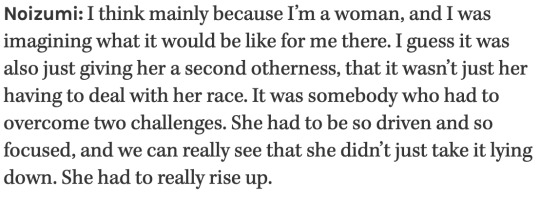
No, Mizu does not pass as a man because she "hates women" or because she hates herself as a woman or being a woman. There are actual on-screen depictions of Mizu's misogyny, like her interactions with Akemi, and dressing like a man is not an instance of this. Mizu shows no discomfort with being a woman or being seen as a woman, especially when she intends to pass herself as and present as a woman. Mizu also shows the women in the series more grace and consideration than any man in the show, in whatever capacity available to her socially and politically, without revealing herself; many of the women have remarked that she is quite unlike other men, and she's okay with that, too.
When she lives on the farm with Mama and Mikio, Mizu shows no discomfort once she acclimates to the new life. But people take this as conclusive evidence of the "only time" she was happy. She was not. This life was also a dance, a performance. The story of her being both the ronin and the onryō revealed to the audience that this lifestyle also requires her to wear a mask and dance, just as the bride does. This mask is makeup, a wedding dress, and submission, and this performance is her gender as a wife. She still understands that she cannot fully be herself and only begins to express happiness and shed her reservation when she believes she is finally safe to be herself. Only to be betrayed. Being a man is her safety, and it is familiar. Being a boy protected her from the white men as a child, and it might protect her heart now.
Mizu shows no discomfort with being known as a woman, except when it potentially threatens her goals (see Ringo and the "peaches" scene). She also shows no discomfort with being known as, seen as, or referred to as a man. As an adult, she seems okay- even familiar- with people assuming she's a man and placing her into the role of a man. Yet, being born a girl who has boyhood violently imposed upon her (she did not choose what mama did to her) is also an incredibly important part of her lived experience. Being forced into boyhood, but growing into a man anyway became part of who she is. But, being a man isn’t just a part of who she became; it’s also expedient for her goals because men and women are ontologically different in her world and the system she lives under.
She's both because she's neither, because- ontologically- she fits nowhere. When other characters point out how "unlike" a man she is, she just shrugs it off, but not in a "well, yeah, because I'm NOT a man" sort of way, but in an "I'm unlike anyone, period," sort of way. She also does not seem offended by Madam Kaji saying that Mizu’s more man than any who have walked through her door.
(Mizu doesn’t even see herself as human, let alone a woman, as so defined by her society. And knowing that creators have stated her future arc is about coming into her “feminine era” or energy, I am actually scared that this show might fall into the trope of “domesticating”/“taming” the independent woman, complete with an allegory that her anger and lack of human-ness [in Mizu’s mind] is a result of a woman having too much “masculine energy” or being masculine in contravention of womanness.)
Some also seem to forget that once Mama and Mikio are dead, no one knows who she is or where she came from. They do not have her background, and they do not know about the bounty on her (who levied the bounty and why has not yet been explained). After their deaths, she could have gone free and started anew somehow. But in that moment, she chose to go back to life as a man and chose to pursue revenge for the circumstances of her birth. Going forward, this identity is no longer imposed upon her by Mama, or a result of erroneous conclusions from local kids and Master Eiji; it was because she wanted people to see her as a man and she was familiar with navigating her world, and thus her future, as a man. And it was because she was angry, too, and only men can act on their anger.
I do think it important to note that Mizu really began to allow herself to be vulnerable and open as a woman, until she was betrayed. The question I've been rattling around is: is this because she began to feel safe for the first time in her life, or is this part of how she sees women ontologically? Because she immediately returns to being a man and emotionally hard following her betrayal. But, she does seem willing to confide in Master Eiji, seek his advice, and convey her anxieties to him.
Being a man also confines Mizu to strict social boxes, and passing herself as a man is also dangerous.
Mizu doesn't suddenly get to do everything and anything she wants because she passes as a man. She has to consider her safety and the danger of her sex being "found out." She must also consider what will draw unnecessary attention to her and distract her from her goals. Many viewers, for example, were indignant that she did not offer to chaperone the mother and daughter and, instead, left them to the cold, only to drop some money at their feet later. The indignity fails consider that while she could bribe herself inside while passing as a man, she could not bribe in two strangers. Mizu is a strange man to that woman and does not necessarily have the social position to advocate for the mother and daughter. She also must consider that causing small social stirs would distract from her goals and draw certain attention to her. Mizu is also on a dangerous and violent quest.
Edo Japan was governed by strict class, age, and gender rules. Those rules applied to men as well as women. Mizu is still expected to act within these strict rules when she's a man. Being a man might allow her to pursue revenge, but she's still expected to put herself forward as a man, and that means following all the specific rules that apply to her class as a samurai, an artisan (or artist), and a man. That wide-brimmed hat, those orange-tinted glasses, and her laconic tendencies are also part of a performance. Being a boy is the first mask she wore and dance she performed, and she was originally (and tragically) forced into it.
Challenging the normative identities of her society does not guarantee her safety. She has limitations because of her "otherness," and the transgression of sex-prescribed roles has often landed people in hot water as opposed to saving them from boiling. Mizu is passing herself off as a man every day of her life at great risk to her. If her sex is "found out" on a larger scale, society won’t resort to or just start treating her as a woman. There are far worse fates than being perceived as a woman, and hers would not simply be a tsk-tsk, slap on the wrist; now you have to wear makeup. Let's not treat being a woman-- even with all the pressures, standards, fears, and risks that come with existing as a woman-- as the worst consequence for being ‘found out’ for transgressing normative identity.
The violence Mizu would face upon being "found out" won’t only be a consequence of being a "girl." Consider not just the fact she is female and “cross-dressing” (outside of theater), but also that she is a racial minority.
I also feel like many cis-het people either ignore or just cannot see the queerness in challenging gender roles (and thus also in stories that revolve around a subversion of sex-prescribed gender). They may not know how queerness-- or "otherness"-- leads to challenging strict social stratifications and binaries nor how challenging them is seen by the larger society as queer ("strange," "suspicious," "unconventional," even "dishonorable," and "fraudulent"), even when "queerness" (as in LGBTQ+) was not yet a concept as we understand it today.
Gender and sexuality- and the language we use to communicate who we are- varies greatly across time and culture. Edo Japan was governed by strict rules on what hairstyles, clothes, and weapons could be worn by which gender, age, and social group, and this was often enshrined in law. There were specific rules about who could have sex with whom and how. These values and rules were distinctly Japanese and would not incorporate Western influences until the late 1800s. Class was one of the most consequential features to define a person's fate in feudal Japan, and gender was quite stratified. This does not mean it's inappropriate for genderqueer people to see themselves in Mizu, nor does this mean that gender-variant identities didn’t exist in Edo Japan.
People in the past did not use the same language we do today to refer to themselves. Example: Alexander The Great did not call himself a "bisexual." We all understand this. However, there is a very weird trend of people using these differences in language and cultures across time to deny aspects of a historical person's life that societies today consider taboo, whether these aspects were considered taboo during that historical time period or not. Same example: people on Twitter complaining that Netflix "made" Alexander The Great "gay," and after people push back and point out that the man did, in fact, love and fuck men, hitting back with "homosexuality wasn't even a word back then" or "modern identity didn't exist back then." Sure, that word did not exist in 300s BCE Macedonia, but that doesn't mean the man didn't love men, nor does that mean that we can't recognize that he'd be considered "queer" by today's standards and language.
Genderqueer, as a word and as the concept is understood today, did not exist in feudal Japan, but the people did and feudal Japan had its own terms and concepts that referred to gender variance. But while the show takes place in Edo Japan, it is a modern adult animation series made by a French studio and two Americans (nationality). Mizu is additionally a fictional character, not a historical figure. She was not created in a vacuum. She was created in the 21st century and co-written by a man who got his start writing for Sex in the City and hails from a country that is in the midst of a giant moral panic about genderqueer/gender-variant people and gender non-conforming people.
This series was created by two Americans (nationality) for an American company. In some parts of that country, there are laws on the book strictly defining the bounds of men and women and dictating what clothes men and women could be prosecuted for wearing. Changes in language and identity over time mean that we can recognize that if Mizu lived in modern Texas, the law would consider her a drag performer, and modern political movements in the show creators' home country would include her under the queer umbrella.
So, yeah, there will also be genderqueer people who see themselves in Mizu, and there will be genderqueer fans who are firm about Mizu being queer to them and in their “headcanons.” The scene setting being Edo Japan, does not negate the modern ideas that influence the show. "Nonbinary didn't exist in Edo Japan" completely ignores that this show was created to explore the liminality of modern racial, gender, class, and normative identities. One of the creators was literally inspired by her own relationship with her biracial identity.
Ultimately, the fact Mizu, at this point in her journey, chooses to present and pass as a man and the fact her presented gender affects relationship dynamics with other characters (see: Taigen) gives this story a queer undertone. And this may have been largely unintentional: "She’s a girl, and he’s a guy, so, of course, they get together," < ignoring how said guy thinks she’s a guy and that she intentionally passes herself as a guy. Audiences ARE going to interpret this as queer because WE don’t live in Edo-era Japan. And I feel like people forget that Mizu can be a woman and the story can still have queer undertones to it at the same time.
#Blue Eye Samurai#‘If I was transported back in time… I’d try to pass myself off as a man for greater freedom.’#^^^ does not consider the intersection of historically queer existence across time with other identities (& the limitations those include)#nor does it consider the danger of such an action#I get it. some come to this conclusion simply because they know how dangerous it is to be a woman throughout history.#but rebuking the normative identities of that time period also puts you at great risk of violence#challenging norms and rules and social & political hierarchies does not make you safer#and it has always been those who exist in the margins of society who have challenged sociocultural systems#it has always been those at greatest risk and who've faced great violence already. like Mizu#Anyway... Mizu is just Mizu#she is gender queer (or gender-variant)#because her relationship with her gender is queer. because she is gender-variant#‘queer’ as a social/political class did not exist. but people WE understand as queer existed in different historical eras#and under different cultural systems#she’s a woman because queer did not exist & ‘woman’ was the sex caste she was born into#she’s also a woman because she conceptualizes herself as so#she is a woman AND she is gender-variant#she quite literally challenges normative identity and is a clear example of what sex non-conforming means#Before the actual. historic Tokugawa shogunate banned women from theater#there were women in the theater who cross-dressed for the theater and played male roles#so I’m also really tired of seeing takes along the lines of: ‘Edo Japan was backwards so cross dressers did’t exist then!’#like. please. be more transparent won’t you?
21 notes
·
View notes
Text
For a show that's supposedly about female empowerment, it's odd how every major female character is heavily influenced by men
Women whose fighting styles are based on men: Ruby (Qrow), Yang (Tai), Cinder (Rhodes)
Women whose ideologies are based on men: Weiss (opposition to Jacques), Blake (same as Ghira)
Women whose stories are almost completely intertwined with men: Nora (personal arc was figuring out who she was without Ren), Pyrrha (almost every scene with her prior to V3 was with Jaune), Emerald (almost every scene prior to v8 was shared with Mercury), Salem (motivated by Ozma's death, cursed by idiot brothers)
If the writing cast reflected the character cast, we probably wouldn't have this problem
#rwde#dont give me any drivel abt qrow basing his style on maria. she didnt exist until v6 and it shows#meanwhile in the v first episode ruby states qrow as the one who trained her#if maria had existed prior ruby wouldve gushed abt having a similar style as THE GRIMM REAPER#this problem tends to escalate w side characters. most groups outside our main protags/antags have a 1:3 woman to man ratio#and ofc every major person in power is a man bc why not#real tired of shows that have a majority x cast being handled by majority y people#this goes for race. sexuality. religion. any demographics w a clear hierarchy#if you wanna have a diverse show it has to be behind the screen too or else you are going to fuck up immeasurably#like writing that you should roll over for your oppressors and hope that theyll just give you your basic rights#ugh#also clarifying major characters as ones that span most the show not ones that center in specific seasons#but p sure even those stories wouldnt function wo men taking some center stage
44 notes
·
View notes
Text
"In early 20th-century Kerala, the Asari (carpenter) caste resisted colonial and Brahminical systems by deliberately ignoring opportunities offered by colonial institutions.
This act of refusal was a strategy against being shaped into compliant subjects within a hierarchical order."
#Kerala#Asari#carpenter#caste system#caste#anti colonialism#anti colonization#class war#human rights#Brahminical#anti hierarchy#fuckhierarchy#ausgov#politas#auspol#tasgov#taspol#australia#fuck neoliberals#neoliberal capitalism#anthony albanese#albanese government
2 notes
·
View notes
Text
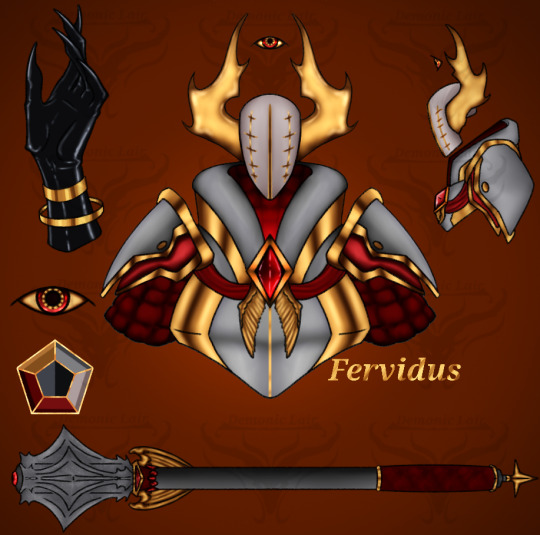


Started as a practice for biblically accurate angels, but ended writing more lore and drawing designs for him to add to the bunch of fallen angels ocs I have.
Fervidus was an angel that fell due to being a warrior driven strongly by emotions, following his heart more than his brain, which led him to act in a "wrathful way" towards humans (though he acted out of personal defence, after a facility captured him and tried to test on him for their own greed).
Fervidus' halo melted the moment he fell into hell, leaving only broken pieces that has horns like shapes.
His helmet has ten golden eyes that he close and open whenever he wants.
Fervidus can't transform into his angelic form anymore and he is still figuring out if he can shift into something more eldtrich or he will remain into his ''humanoid'' form.
Fervidus wanders around Earth, hunting down the humans that caused his demise, although he is slowly drifting away from his actual goal.
He is still in denial from being casted out and this is slowly turning him even more wrathful, a bloodlusted being.
Fervidus denies also his growing interest into some humans or even demons, appreciating more how life on earth works and visiting the hell's rings to learn more about that reign.
#I'm still learning angel hierarchy since my main interest is demons and hell kings#but I have a feeling as an ex warrior angel Fervidus would be a Power#one of my fav ''trope'' are fallen angels#i just like all the conflict and angst you can write with them and their reaction to new worlds they never knew well#and how their reaction to being casted out could be different depending on the ex angel personality#angel#angel oc#fallen angel#fallen angel oc#fervidus#my art#terato#monster oc
6 notes
·
View notes
Text
It doesn't matter how many "illegals" you throw out. Because there will still be drugs, rapes, murders, thefts, etc. Wanna know why? It's pretty fucking simple. We're human beings. We fuck shit up more than we'd like to admit. It's quite hilarious that we blame our own problems on another race or another country. When the problem lies within ourselves as a nation, as a people, as individuals. You can't call someone illegal, when your own ancestors invaded a country, and took someone else's home, and made it their own. Enslaved, raped, murdered, colonized and whitewashed it down. And then two-hundred years later you fear the same thing is going to happen to you. That's fucking crazy. Because when it all comes down to it, we fear retribution. We fear consequence and are blind to other's suffering due to the fact that we fear we will suffer the same fate. Now I know America is full of bullshit. But this particular bullshit and how everyone just simply agrees with it, as if it's a relevant problem really irks me.
Because once again America has shown its own true racist bullshit colors. As if there aren't any white people stealing, bringing in drugs, raping or murdering people or wrongfully using welfare.
We as a nation, as a whole species honestly should take a look at ourselves and see our own hypocrisy. Many superior empires and nations have fallen or have been taken over. And this whole cycle of insanity continues, and continues, and continues. Because we do not view each other as equal. We may say that all men are created equal. But have we shown that we believe that? I mean look at us, we will tear down anyone we see as inferior or deserving of mistreatment. We may have AI, iPhones, Laptop computers and 8k ultra hd televisions. But we are still the same barbarian species as we were thousands of years ago. We are still the same fearmongering bunch. We still reject the new, we isolate the different and we ridicule the weird and those who aren't like us. While all the meanwhile behind closed doors, we're all pretty fucking weird ourselves. It's comical. It really is. Because y'know I don't hear many people express these kinds of thoughts or beliefs. Because it's fundamental to our own beliefs we have. It's controversial. We don't wanna hear it. We don't wanna know it. But it's the cold, hard truth, and we can't handle the truth. Because deep down, we don't like the truth. The truth hurts when you actually think about it. And a majority of people would rather believe a certain way, to make themselves feel better about the things they've done or let happen. Then to admit that we are wrong about a lot of things.
#anti capitalism#thanks for coming to my ted talk#lgbtqia#lgbt pride#george carlin#caste system#hierarchy#activism#evolution#insanity#immigration#feminism#hate crimes#ted talks#personal rant#rant post#venting#vent post#american nightmare#indigenous#native american#whitewashing#discrimination#caste society#hierarchy society#revolution#philosophy#alan watts#americanisms#isms.
4 notes
·
View notes
Text
save me Jadg Doga....
#for real ive grown an appreciation for its design#im like. the only person in this fanbase who treats individual ms like theyre characters#(as evident from my gundam comp video and my hundreds of drawings)#like i love classic char yaoi stuff and zeta guundam and zz gundam cast for their characters but the mobile suits are so much more cool#also i hate using the word “fandom” it feels so gross to use#like isnt the -dom part of the word mean like ruling. like in Kingdom? or Stardom?#it alludes to a hierarchy of people within a fanbase#which most often than not in big (and toxic) fanbases there is#side mission
3 notes
·
View notes
Note
I'm the Silver Tongues anon and I can ensure you my cognitive abilities are at least as sharp as yours :) Like those 14-16 year olds, you seem to think that everything Louis does is layered and nuanced and oh-so-deep. But in Silver Tongues, the lyric is straightforward,. It is what it is.

anon when they find out that straight forward lyrics when looked at in the context of the entire song as a whole can have layered and nuanced meaning and invoke multiple emotions in people who are able to look past the obvious
#anon#silver tongues#calling a song that simultaneously manages to address#comradry community and friendship#while also hinting at the reality of being confined within a social hierarchy where the impoverished are standardized#as well as addressing the concepts of seclusion solitude and the shadows they might cast#all the while inducing a sense of nostalgia so strong you can practically feel it grip your heart#“straightforward”#is obviously going to be cause for someone to assume the worst about your cognitive abilities#fuck around and find out ig
3 notes
·
View notes
Text
Hierarchical Influence of Vegetarian Practices in India
Hello everyone,
I am a student of Anthropology at Amity University. I'm working on a paper that explores the influence of social hierarchies, that is, caste on the dietary practices in India.
I have created a short survey to gather people's personal opinions and experiences on caste based food practices. The questionnaire should only take a few minutes to fill and all your personal information will be kept confidential. You can take the questionnaire only once but can edit your answers till the survey is closed on 28th June, 2025. This questionnaire is specifically targeted towards Indians, both residential and non-residential.
I would appreciate it if you could take the time to respond or share this information with your colleagues or peers. Your contribution is greatly valued.
0 notes
Text
Roads, Castes, among Other Names
Note: The information provided is a breakdown of House Kheperu, Strigoi Vii, House Sahjaza and Aset Ka. I play no favorites; information is information. I have no connection beyond the literature to any of these groups.
The Roads were first made public in the Book of Secrets by Goddess Rosemary, the Matron and Founder of House Sahjaza, which was a big influence to the Sanguinarium and the Ordo Strigoi Vii as Father Sebastiaan was a long time member and Elder. The Roads influenced House Kheperu's/Kherete Caste System.
Asetians argue the point they were the originators of this system, what they call Lineages, but the timeline of published material tells a different story.
The Theory
According to both House Kheperu and Aset Ka, the Castes and Lineages were formed thousands of years ago in Ancient Egypt during an alteration of their energy systems. In many Vampyre circles they call their members Family to denote this ancient connection.
Kheprians believe this augmentation severed them from the divine so they must reincarnate for an eternity rather then have the option to go forth into an afterlife. Neither a Paradise nor Hell realm are open to them.
Asetians believe their Vampyric ancestors were augmented by Aset (Isis) herself as a way to stay connected to their mother goddess. While Aset Ka consider themselves Vampyres, they maintain the position they are not the same as the Vampyre Community. Much like Temple of the Vampire, they push the idea they are an elite group of magicians and not simply members of a subculture.
Unlike the Temple of the Vampire, Asetians are not against blood drinking, although they prefer to keep it within their own groups. I have issues with the concept of Vampyres feeding on Vampyres, but that is a topic for another time.
Ordo Strigoi Vii utilizes this same system and refers to them as the Three Currents of Elorath. The term 'Current' here is used different then the standard magical term. 'Current' usually refers to an entire body of magical belief rather then a concept within a singular body. Usually, Current would be used to denote the entire Vampyre Culture or other body of magicians and their concept of the Great Work.
For example there is the 93 Current (Thelema), 156 Current ("Chaos conjoined with Babalon"), or simply the Chaos or Satanic Currents, the entire body of Chaos Magicians and Satanists, respectively.
Rant aside, Ordo Strigoi Vii teaches these alterations were not simply a severing one from the divine but an alteration, or even evolution, in how a Vampyre acheives their Zep'r, their Immortality. This is called 'Defeating the Second Death.'
Trinity of Feeding and Ritual
The three styles of energy work, in order from Strigoi Vii, Kherete, and Asetian, are as follows:
Mradu, Warrior, Scorpion/Guardian. The Warrior is the most grounded of the three and they are considered the protectors and soldiers within the Community. They also are understood to need to feed less then the other alterations since they are bound closer to the physical realm and have a higher compacity for energy storage.
Kitra, Counselor, Scarab/Concubine. The Counselor fits the empath and healer concepts, as they are highly sensitive to emotion, energy of themselves and others. They may have a gift or leaning toward therapeutic listening, loving touch, and the ability to bring balance to intense situations. According to the literature, they can help reduce the Warriors rage and the Priest filter life force.
Ramkht, Priest, Serpent/Vespertine. The Priest or Priestess denotes the highly sensitive nature of their condition. They consume energy at a higher rate then either the Counselors or Warriors and also may need help grounding and staying present in the mundane world.
Personal Work with the Caste System and Conclusion
As a solitary Vampyre, these styles of feeding and manipulation may seem of little use as they are generally used for understanding and praxis of ones working of energy in relation to ritual. The Priest calls forth the magical energy, the Counselor weaves the energy through the ritual chamber, and the Warrior grounds it at the end of the ritual.
Understanding these concepts, though, the solitary Vampyre can play with these styles and see which one fits best on a psychological and feeding level.
If you need to feed quite often, say once or several times a week, and find yourself the victim of racing thoughts, particularly about philosophical and spiritual concepts, then you may benefit from learning more about the Priest Road.
If you need to feed on a semi-regular basis, but not quite as much as the Priest, and have symptoms of empathy, like feeling other peoples emotions without meaning to, or get a little to distracted or influenced by others energies, then you may benefit from learning more about the Counselor Road.
If you find yourself a bit more grounded, needing to feed less often then the above, maybe once a month, even longer, and find yourself with a lot of rage, pent up creative energy, and prone to emotional outbursts, then you may benefit from learning more about the Warrior Road.
Maybe you don't fit into any of them or they flow depending on the season or what is going on in your life at the moment. Food for thought.
Resources:
Book of Secrets, Goddess Rosemary
Psychic Vampire Codex, Michelle Belanger
Vampyre Sanguinomicon, Father Sebastiaan
Vampyre Magick, Father Sebastiaan
Asetian Bible, Luis Marquis
#vampyre#vampire community#vampyre culture#Castes#Roads#Caste System#vampirecore#Houses#Vampyre House#Vampyre Coven#Vampyre Court#Vampyrism#Vampyrecraft#“bloodlines”#zep'r#xeper#kheper#psychic vampyrism#psi vampyrism#psi vamp#psychic vamp#Vampyre Philosophy#Twilight#Nightside#hierarchy
1 note
·
View note
Text
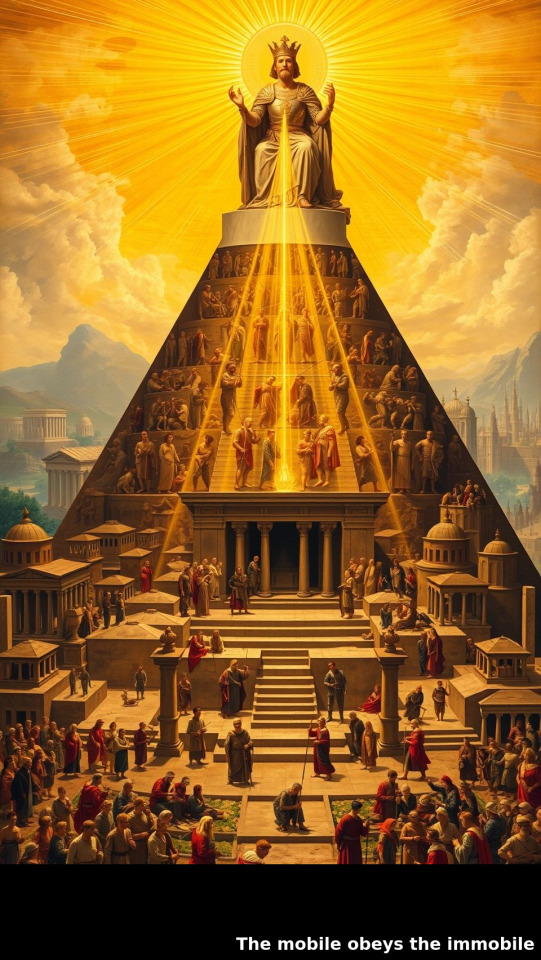
Know your caste—transgressing your nature brings decay. True order: workers submit to merchants, merchants to warriors, warriors to the sacred king. Tradition is hierarchy. #Evola #Traditionalism #Hierarchy #Castes
0 notes
Text
ब्राह्मणवाद का ऐतिहासिक उद्गम और प्रभाव
ब्राह्मणों का इतिहास भारत के प्राचीन समाज के निर्माण और विकास से जुड़ा हुआ है। ब्राह्मणों को समाज में एक उच्च स्थान प्राप्त था और उन्हें वैदिक यज्ञों, धार्मिक अनुष्ठानों और शिक्षा का संरक्षक माना जाता था। इस आर्टिकल में हम ब्राह्मणों की उत्पत्ति, जाति और वर्ण व्यवस्था की स्थापना, इसके राजनीतिक और सामाजिक प्रभाव, महात्मा गांधी और डॉ. बी. आर. अंबेडकर द्वारा ब्राह्मणवाद के विरुद्ध संघर्ष, और निम्न…
#caste discrimination#caste-based violence#civil rights#community empowerment#cultural identity#educational access#equality#grassroots movements#heritage and history#historical analysis#Indian society#intersectionality#justice and equality#marginalized communities#minority rights#political activism#social hierarchy#social reform#socio-economic development#untouchability
0 notes